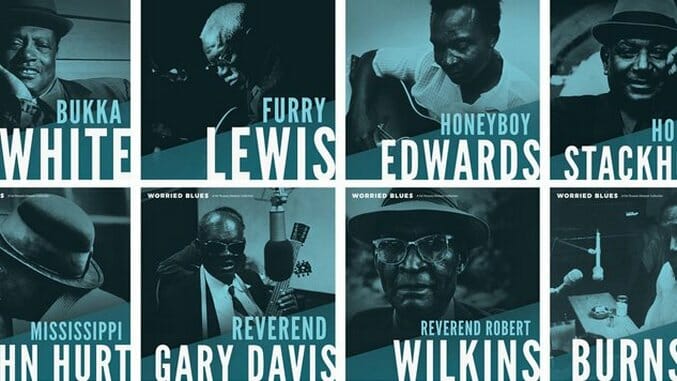The 15 Best Delta Blues Songs

The blues are some of the most iconic sounds of America. What began in the South in the late 19th century as a mix of work songs and spirituals evolved into a mostly secular, acoustic guitar driven musical embodiment of suffering, struggle and—in the best case scenarios—triumph that proliferated during the early-to-mid 20th century. But the blues also encompass a range of regional dialects. The West Coast blues, mostly centered in California, incorporated more piano work and jazz influences during the 1940s, while the Chicago blues electrified some these sounds in the 1950s and ‘60s. The Hill Country blues of northern Mississippi used a rhythmic, repetitive style of guitar playing with mirrored vocals. But it was the Delta blues, hailing from the area surrounding the delta of the Mississippi River, which truly began the movement of the blues and encapsulates the style, genre and soul of what we now call, “the blues.”
Last week, Oxford, Miss.-based independent record label Fat Possum Records teamed up with Amazon Music to release a 10-album collection of previously unearthed blues cuts called Worried Blues. Each record highlights a different artist, ranging from Delta blues originators like Skip James and Bukka White to lesser-know performers like Furry Lewis and Honeyboy Edwards. With such an expansive set of new old music to discover, and considering the seemingly endless troves of blues history, we decided to create this entry point to the originators of the genre with the 15 best Delta blues songs.
15. Big Bill Broonzy, “Key to the Highway”
Lee Conley Bradley, known by his nickname Big Bill Broonzy, is actually credited with co-writing this blues standard with Charles “Chas” Segar. The song is performed as a traditional 12-bar blues and depicts the migratory, transitory nature of many lower class workers in the South. “Key to the Highway” was inducted into the Blues Hall of Fame in 2010 and a range of artists including The Rolling Stones, Eric Clapton, Led Zeppelin and Bob Dylan have covered it over the course of their careers. In fact, Sonny Landreth just offered a slide-filled version in the Paste Studio that you can hear right here.
14. Mississippi John Hurt, “Avalon Blues”
Mississippi John Hurt spent most of his life working on farms in Carroll County, Miss. (about 100 miles north of Jackson). This song, which features his iconic quick-paced finger picking, is about his home in Avalon, Miss. Although he didn’t gain much recognition as a musician in rural Mississippi, once he left the state in 1963, he began playing shows and festivals across the country. Hurt’s first recordings from 1928-29, including this song, have since become some of the classics of the canon.
13. Howlin’ Wolf, “Smoke Stack Lightening”
Although he became one of the most famous voices of the Chicago blues movement, Howlin’ Wolf was actually from Clay County, Miss. The man born Chester Arthur Burnett got his start in the 1930s listening to Charlie Patton at local juke joints. “Smoke Stack Lightening,” one of Wolf’s most famous works, represents a sort of bridge between the Delta and Chicago. While the harmonica interludes and ooh-ooh refrain position the song closer to the northern blues rock future, its foot stomps and traditional structure keep it firmly rooted to its stylistic origins.
12. Big Joe Williams, “Baby Please Don’t Go”
Known for his use of a strange nine-string guitar, Big Joe Williams also became a transitional figure in the blues. While a young Muddy Waters tagged along with him during his travels through the Mississippi Delta, Williams also made a name for himself at folk and blues festivals across the country in the 1960s. “Baby Please Don’t Go,” a song he adapted and popularized in the mid-‘30s, has since been covered and interpreted by Van Morrison, AC/DC, Aerosmith and more outside of the blues canon.
11. John Lee Hooker, “Boogie Chillen”
John Lee Hooker’s oft-imitated style didn’t necessarily reflect his roots. His home of Tutwiler, near Clarksdale, Miss., is technically the land of Hill Country Blues—where the slow crawling guitar melodies meander up and down guitar necks like North Mississippi’s dirt roads. Instead of continuing this tradition, Hooker mastered the 12-bar blues that fit as well on the Ford factory lines he worked on in Detroit, as well as rural Mississippi. His incessant foot-stomping and tempo-fluctuating tendencies while performing live earned him the title the King of the Boogie. This song, “Boogie Chillun,” showcases Hooker’s famous boogie blues and helped him sell a million copies of the single in 1948.
-

-

-

-

- Curated Home Page Articles By Test Admin October 21, 2025 | 3:10pm
-

- Curated Home Page Articles By Test Admin October 21, 2025 | 2:57pm
- Urls By Test Admin October 21, 2025 | 2:57pm
- Curated Home Page Articles By Test Admin October 21, 2025 | 2:55pm
-

-

-

-

-

-

-

-

-

-

-

-

-

-

-

-

-

-

-

-

-

-

-

-

-

-

-

-

-

-

-




































